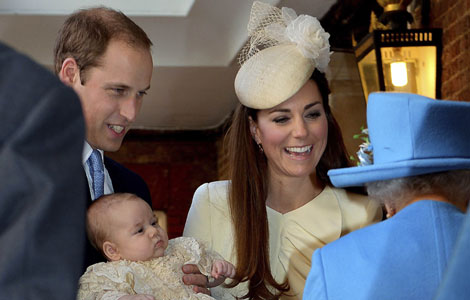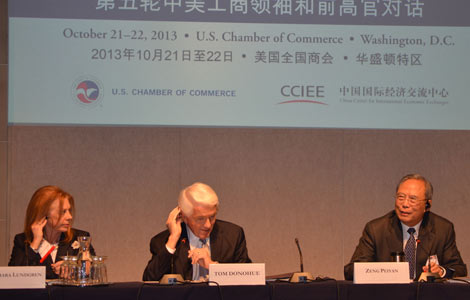Reforms will be comprehensive, president says
Updated: 2013-10-24 00:40
By CHEN JIA (China Daily)
|
||||||||
Blueprint to cover financial system, markets, land use, anti-corruption
President Xi Jinping assured international economists and management experts that the upcoming Third Plenary Session of the Communist Party of China in November will hammer out a blueprint for comprehensive reform.
Chinese leaders will establish the country’s all-encompassing reforms for the next decade, he said on Wednesday while meeting overseas members of the advisory board for the School of Economics and Management at Tsinghua University.
Xi said the November meeting for the 18th CPC Central Committee will be important for China to create a rebalancing of reforms, development and stability. The plenum will also help China generate new ideas to develop the economy and sharpen creativity .
In the nation’s new round of reforms, Xi also stressed the importance of understanding the "advanced international experience" and strengthening education reforms in order to give top-quality talents the most ideal opportunities in China.
Analysts said it is the first time the president has confirmed that a forthcoming plenum’s agenda will be "comprehensive". Previously, agendas mainly focused on reforms of certain industries and sectors.
Economists over the last few weeks said comprehensive reform will likely cover the financial system and markets; relations between the central and local governments; urbanization; the land-use system; industrial rebalancing; and new efforts to tackle government corruption.
Li Jinliang, deputy dean of the School of Economic and Management at Tsinghua, said that considering China’s current industrial environment and its relative growth patterns, more reforms, both concerning macro-economy and in the management and operations of businesses, are needed.
"Chinese enterprises need more managers who have international vision and experience. They can improve a business’ competitiveness and improve the overall economic environment," Li said.
He expects that the new economic reforms will consider the histories of international economies but be based on China’s cultural values and issues.
Fan Jianping, chief economist at the State Information Center, a government think tank, said on Wednesday that the most immediate task to improve China’s economy is to implement structural rebalancing measures. Fan added that China should place less of an emphasis on economic growth rates.
"We are willing to take the initiative to slow GDP growth down but it must be done within a reasonable range so that we can create more room for economic reforms," Fan said.
During his Wednesday meeting, Xi said the national economy is stable and progressing.
"Economic growth and other main indicators still remain within their expected targets," he said.
The State Information Center predicted on Wednesday that GDP will grow in the fourth quarter by about 7.6 percent. That mark will lead to a 7.7 percent growth for the entire year.
"Growth may slightly drop to 7.5 percent in 2014," Fan said. "To stabilize growth, we need new economic driving forces."
The advisory board of the School of Economics and Management at Tsinghua University was created in October 2000 and has met annually to offer advice on the development of the country’s economy.

 Giant duck to exit after drawing the crowds
Giant duck to exit after drawing the crowds
 Ministry to begin inspecting most heavily polluted regions
Ministry to begin inspecting most heavily polluted regions
 Spy claims stir rebuke to Obama
Spy claims stir rebuke to Obama
 Paint the world a picture
Paint the world a picture
 World's first 1-liter car debuts in Beijing
World's first 1-liter car debuts in Beijing
 Latin American clown convention
Latin American clown convention
 Prince George baptized in London
Prince George baptized in London
 Mass. teacher slain; 14-year-old student charged
Mass. teacher slain; 14-year-old student charged
Most Viewed
Editor's Picks

|

|

|

|

|

|
Today's Top News
US firms urge easier process for investment
China calls for strengthened EU ties
Spy claims stir rebuke to Obama
Traders in Yiwu cashing in on e-commerce shops
PMI heads for 7-month high
Ministry to inspect most heavily polluted regions
Ban to help protect kids from sexual predators
Returnees are 'seed capital' for startups
US Weekly

|

|







